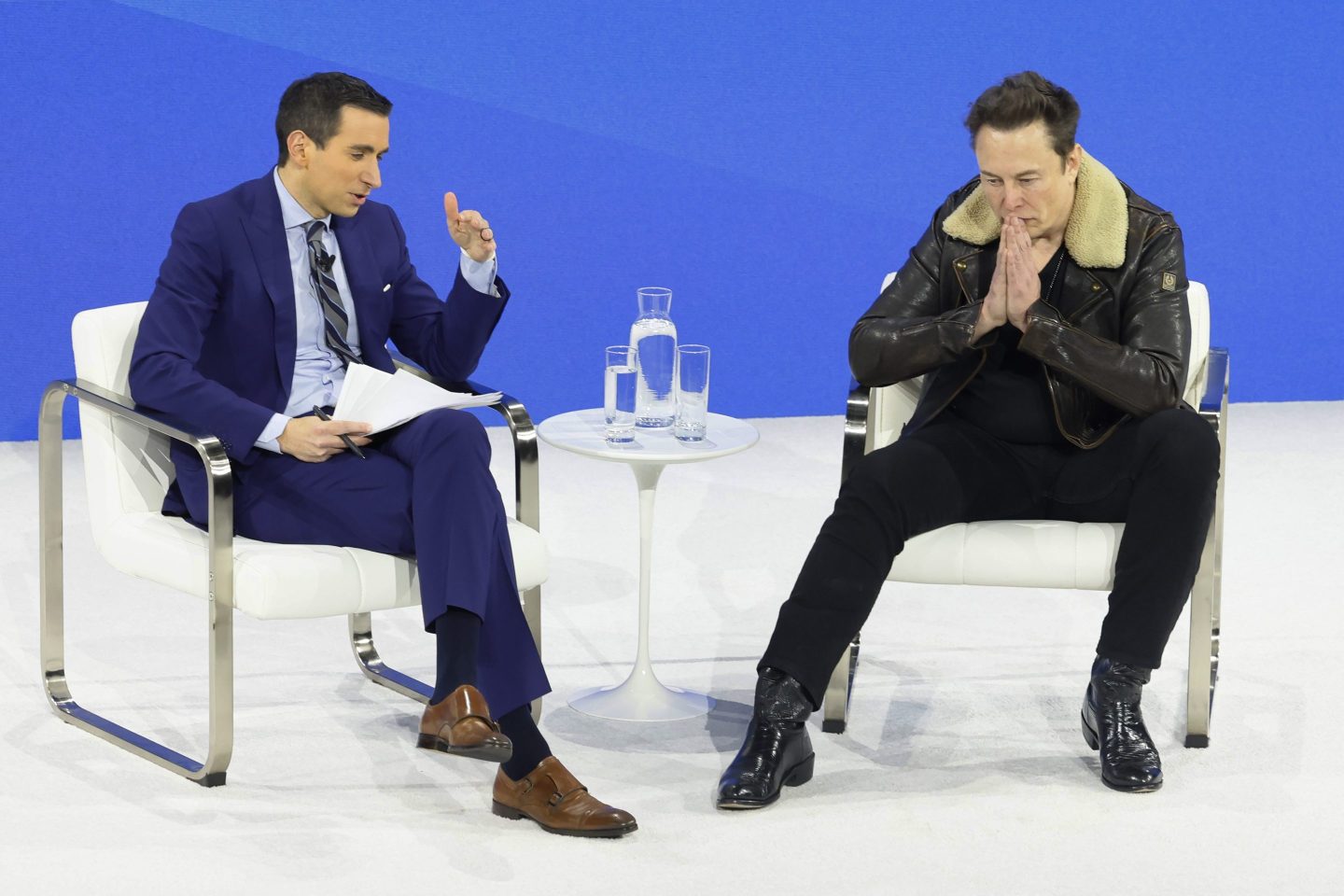Let me preface the following by apologizing to readers who sometimes accuse me of writing about Elon Musk too much. As I told the last one: the longer the period between occasions when I need to write about the man, the happier I am. Obviously, an interview in which Musk repeatedly urges advertisers to self-copulate, and to avoid advertising on X, is one of those occasions.
Now, I’m no advertiser-relations veteran like Linda Yaccarino is, but I suspect Musk’s profanity-packed reaction to the exodus of X’s advertisers (itself a reaction to X running their ads next to toxic content) will make the CEO’s job harder. Here’s Yaccarino’s message to advertisers, following what she described as Musk’s “candid” interview: “X is standing at a unique and amazing intersection of free speech and Main Street—and the X community is powerful and is here to welcome you. To our partners who believe in our meaningful work—thank you.”
And to the rest, presumably, the boss already said it. Musk clearly won’t back down, even if, as he himself admitted, the advertising boycott will “kill” X. “The whole world will know that those advertisers killed the company, and we’ll document it in great detail,” he bristled.
Musk’s interview with Andrew Ross Sorkin at the New York Times’ DealBook Summit was extraordinarily revealing, not just in terms of his obstinance and his predilections for victimhood and taunting people—all regularly evident on his X feed, though the live performance is a different experience—but also because of what Musk said about himself. His mind is a “wild storm,” and an unhappy one at that. He has too many ideas and an inability to execute on all of them.
Whatever you think of Elon Musk, he is very consequential to our age, so his willingness to turn himself inside out is a public service of sorts. He is clearly a deeply thoughtful person, and he likes to share the results. But while that can be rewarding at times, some of the views he expresses get him into richly deserved trouble and make usership of X and ownership of a Tesla an ideological choice that most people would rather not have to make.
(Regarding his recent anti-Semitic X post, Musk apologized and said it “might be literally the worst and dumbest post I’ve ever done” … then immediately attempted to justify it, arguing that his endorsement of someone’s claim that Jews promote “dialectical hatred against whites” was a reaction to Jewish people funding “radical Islamic groups,” which they apparently do out of a “natural affinity for persecuted groups.” I was watching from behind my hands at this point.)
Musk’s was not the only good interview to come out in the past day. Sam Altman spoke to The Verge’s Alex Heath about his defenestration from OpenAI, and his now official rehiring. (Microsoft now gets a nonvoting observer role on the OpenAI nonprofit board, which seems like a compromise that will at least allow it to avoid being blindsided like it was earlier this month, though it may fall short of the influence Microsoft might hope for as owner of 49% of OpenAI’s commercial arm.)
Altman repeatedly refused to address the events that led up to his firing by OpenAI’s former board and dodged a question about whether he himself wants to be on the new one, but he nonetheless had some interesting nuggets to share. Apparently, OpenAI “did not lose a single employee [or] a single customer” during the fiasco. The company’s “governance structure had a problem” that will take a while to fix.
“My immediate reaction [to the firing] was sort of one of defiance, it was like, ‘Man, I’m hurt and angry, and I think this sucks,’” Altman said, but he was able to “snap out of it and get over the ego and emotions” and then agree to return. Finding out the company could function without him (for five days, but carry on) was “a very nice thing,” because “either I picked great leaders or I mentored them well.”
Okay, it’s not Musk-grade transparency and headline-making, but that may be wise. More news below.
David Meyer
Want to send thoughts or suggestions to Data Sheet? Drop a line here.
NEWSWORTHY
SIGNIFICANT FIGURES
100%
—The proportion of Okta customer support users who were affected by a data breach at the identity management platform. 100% is not 1%, which is the proportion of users Okta originally said was affected. Okta: “We identified that the file size of one particular report downloaded by the threat actor was larger than the file generated during our initial investigation. After additional analysis, we concluded that the report contained a list of all customer support system users.”
IN CASE YOU MISSED IT
The death of TikTok’s $2 billion Creator Fund is stoking fears among influencers about the value of short-form videos on the platform, by Alexandra Sternlicht
Inside Gary Gensler’s efforts to remake the SEC, by Leo Schwartz
Fresh off an Intel investment, Stability AI looks for buyers as investors pressure CEO to resign, by Bloomberg
Salesforce soars 8% as cost cutting shows its ‘brand new religion’ to increase profits, by Bloomberg
BEFORE YOU GO
Google AI discovers crystals. DeepMind has used AI to discover “2.2 million new crystals—equivalent to nearly 800 years’ worth of knowledge,” the Google unit announced in a blog post yesterday. Around 380,000 of these are stable materials that “could power future technologies,” it said, and external researchers have already been able to independently create 736 of them.
One of those researchers, Gerbrand Ceder of the Lawrence Berkeley National Laboratory, said the facility’s A-Lab (in which AI-guided robots make stuff) had a “staggering 71% success rate” in producing the predicted compounds, making over two new materials a day. “We can make and test materials faster than ever before,” he said.
This is the web version of Data Sheet, a daily newsletter on the business of tech. Sign up to get it delivered free to your inbox.












